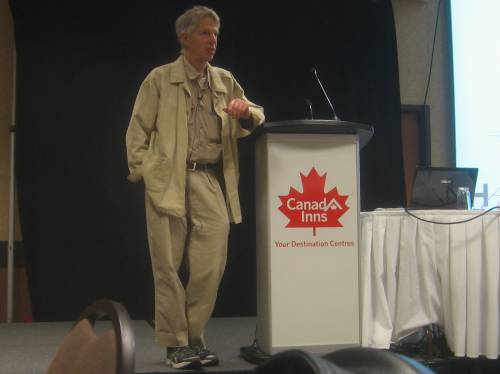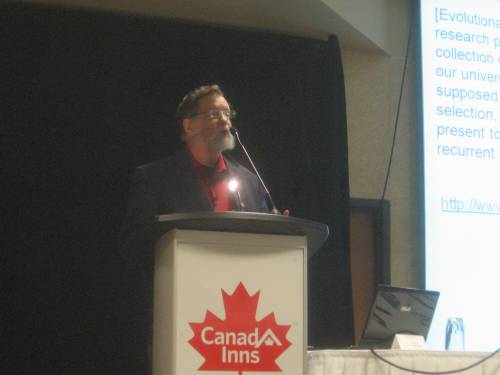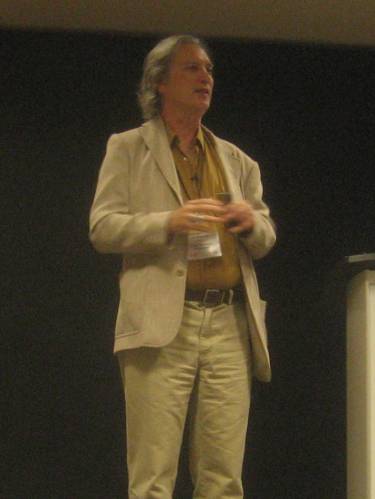Shortly after Stephanie's presentation the day before, one of the leaders of HA²M came up before the stage and commented that the group had a "commitment to diversity." A commitment to a cause is an encouraging thing to hear, but it needs to be put into action in order to be credible. Some of the chatter I heard in the back channel suggested that the speakers were disproportionately white and didn't reflect the true diversity of Winnipeg. One point that I thought stuck out was that although this was a Canadian conference with an overwhelmingly Canadian audience, over half of the speakers were American. I did have a good time at the conference, met a number of great people and new friends, and felt fortunate to be there...but in the interest of questioning and seeking betterment in everything, I wonder if it could be improved.

The post-conference period was spent sightseeing and looking for hidden treasures. I visited two indoor flea markets that an acquaintance suggested might be good places to find old license plates. Alas, it was not to be. Some nut at one had hoisted the Gadsden Flag in his booth, and the only plates I found at the other were overpriced examples surrounded by crucifix, hunting, and neo-Confederate paraphernalia. Very doubtful.

To wash away the experience, I headed downtown. The Esplanade Riel is a cable-stayed footbridge over the Red River that opened in 2003. It's unapologetically modernist, and leaves a terrific visual impact from any angle.

Near the west abutment of the bridge lies the Citizen Garden, covered in thousands of tiny
blue flags decorated with peoples' faces. My initial reaction was pensive: Was this the memorial to some tragedy, like so many installations in the States? No: It was a celebration of life and optimism in the present day. Each flag represented a real person in Winnipeg...2015 of them in all...and their thoughts on what was "cool;" simple as that.

The Canadian Museum for Human Rights completed the dramatic aura of the vicinity. It had opened almost exactly one year to the day before, in September of 2014.

Underneath the complex, irregular exterior lies an interior of spiraling corridors and labyrinths that slowly wind their way to a glass observation tower at the very top. Many of the interior spaces are open above, with courtyards visible across many levels. There are artifacts, information, and multimedia exhibits on subjects ranging from individual achievements to the Universal Declaration of Human Rights. The staff simultaneously say "hello" and "bonjour," in a nod to Canada's multilingualism.

The museum's scope and limitations have been debated, and almost inevitably been mired in controversy...and I wouldn't doubt that there are human rights atrocities going on that didn't warrant a mention in its walls.
Nevertheless, the museum packs an emotional wallop. It reminded me how the human right of universal healthcare is taken for granted in most countries of the world...yet denied in mine. It continually reminded me that I'm livid that my own neighbors and family have rolled back and eliminated labor rights, gay rights, and women's rights south of the border in Wisconsin and Michigan, and I'm livid that a white-supremacist, Christian-nationalist ideological cult is revered as a major political party by almost half the voters in the USA.
The Holocaust exhibit was prominent, and especially poignant. Of the photographs on display, two were particularly eerie as they represented scenes of concurrent, "ordinary" German life: One was of a commercial building partially covered in national flags (i.e., Nazi banners) and posters promoting the national leader (i.e., Hitler). Another was a picture of a young girl on a street corner, making a Nazi salute in tandem with the adults that surrounded her. Had my own family been displaced into Germany, I have little doubt that my own grandmother or grandfather would have been the girl in that position...going with the flow, obligingly supporting the ruling party without giving critical thought as to why...as her neighbors disappear.
What else was poignant? Take some policy points, for one: Disenfranchisement and the withdrawal of political power...union busting...school textbooks being rewritten to reflect a racist, Christianist point of view? That's the Deutsches Reich in the 1930s...and it's also the United States of America in the year 2015.









Recent Comments